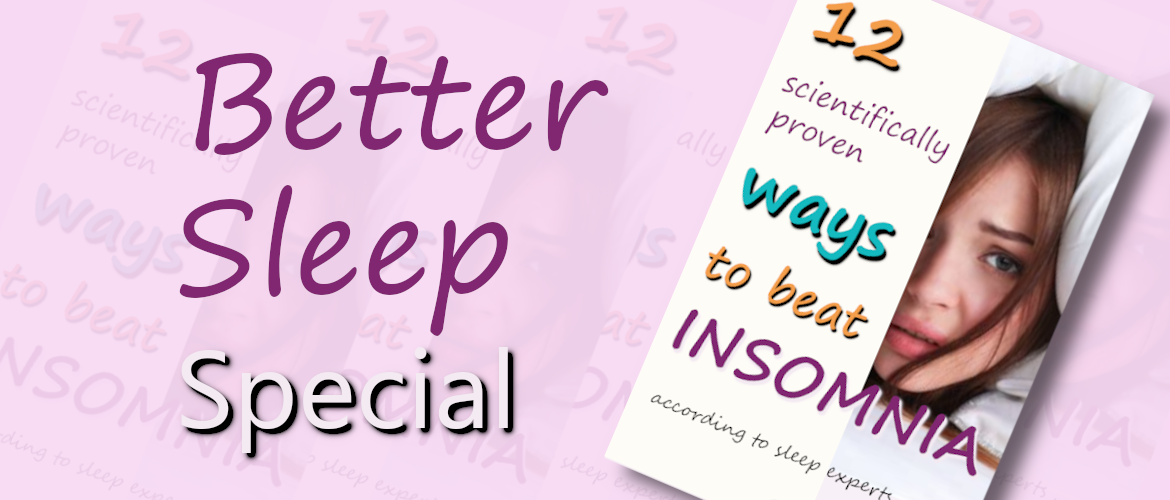Or 12 hacks for a better sleep!
What’s crucial to the learning process? What helps us process our emotions? What makes us good humored and easy-going? What keeps us sane? What helps us to slim? What keeps us alive? What would make the American economy about $411bn a year richer?
You guessed it: a good night’s sleep!
That’s right! Fortune.com reported in 2016 that sleep deprivation costs the American economy $411bn in lost productivity per year! But that’s not all! Almost all psychiatric disorders are in some way linked to sleeping disorders. Furthermore, according to Harvard School of Public Health, 3 to 5% of adult obesity could be caused by a lack of sleep. A long period of sleep deprivation can literally kill you. And last but not least, a study about learning and motorskills revealed that sleeping directly after learning or practicing improves the overall skillset by 35%.
We can see from these few facts how important sleep is. Yet, growing up, we are not taught much about it. And as adults, we sometimes treat sleep more like an incovenience that can by and large be ignored. It is therefore no wonder that almost everybody at some point in their lives experiences sleep problems or develops unhealthy sleeping habits. So if you are one of us, don’t worry, and welcome to the club!
How many hours should we sleep?
We need on average around 8 hours of sleep a night throughout our adult lives. Some can get by with 6 hours, but less than that causes us harm.
What most of us have problems with, when it comes to sleeping:
- We have difficulties falling asleep (falling asleep should take on average 10 – 15 minutes).
- We wake up during the night.
Reasons we have problems with insomnia:
- Stress, worry, anxiety
- Lifestyle choices
- Sleeping disorders, like Sleep Apnea and Delayed Sleep Phase disorder, etc.
Besides treating the underlying sleep problems with the help of professionals, there are things we can do to improve on our sleep experience and work on our sleep problems. Sleep expert Matthew Walker (« Why We Sleep ») recommends the following:
12 Scientifically Proven Ways to Beat Insomnia
or 12 hacks for a better sleep:
- Sticking to a sleep schedule
We are creatures of habit. If we want to improve our sleep we should therefore always go to bed and get up at roughly the same time. Walker recomends setting an alarm for bedtime as well as for getting up. (Personally, I can’t stand the sound of my morning alarm, so I have chosen a different ringtone for the evening.) - Sport is good, but not too late in the evening
Ideally, we should exercise for at least 30 minutes a day, but our bodies need to be calm for sleep. So it is best to exercise no later than 3 hours before bedtime.
- Avoiding stimulants in the late afternoon
I imagine I am not the only one this concerns!
Coffee, cola, chocolate and many delicious teas contain stimulants like caffeine, which make it hard to fall asleep. Nicotine is also a stimulant. - Avoiding too much alcohol before bedtime
While a glass of wine with dinner may relax us, an entire bottle hinders us from falling into the REM stage of sleep. (REM = Rapid Eye Movement or dream stage.) In this stage our brain is very active, helping us process emotions and events. Too much drinking also impairs our breathing and tends to wake us up, when the effects of the alcohol wear off. - Generally avoiding eating and drinking too much at night
Schedule smaller portions in the evening and not too much fluid that makes us go to the toilet during the night! - Avoiding medicines that disrupt sleep
Medications, herbal or otherwise, can be sleep disruptive. That includes remedies for colds, coughs, allergies, heart problems, blood pressure and asthma. It is therefore worth asking our healthcare providers about their impact on our sleep. - Not napping after 3 pm
Too much napping makes it harder to fall asleep at night! - Relaxing before bedtime
It is important to have some time to unwind in the evening. Scheduling a relaxing activity like reading, meditating, doing a Sophrology exercise or listening to calming music helps with a good night’s sleep. It is recommended to have some sort of relaxing habit or evening ritual before going to bed. - Taking a hot bath before bed
The drop in body temperature after getting out of the bath helps us feel sleepy. - Dark bedroom, cool bedroom, gadget-free bedroom
Many of us are guilty of this. The laptop or phone with a bright screen right in front of us in bed for a last social media check before we go to sleep! But when we are suffering from insomnia the bedroom should really be dark, cool and free from sleep disruptive stuff! We should not be exposed to the artificial bright lights of a phone or laptop. We should even turn the clocks out of view. - Having the right sunlight exposure
Daylight is important for our sleep patterns. We should get a dose of natural day or sunlight for at least 30 minutes a day. If possible in the morning. To prepare for going to bed we should dim the lights. - Not lying in bed awake
If we have difficulties falling asleep and it takes more than 20 minutes, it’s best to get up again and do something relaxing. It is important not to get anxious about not being able to fall asleep.
To take away
Insomnia and sleeping difficulties can have a severe impact on our health. At the same time a good night’s sleep is a tool to improve our well-being and a key to healing. If we are suffering from sleep difficulties it is most important to start sticking to a sleep schedule. We are creatures of habit and a schedule is the no. 1 tip to get our body to adjust itself to sleep, even if it doesn’t happen overnight. With a comfortable, gadget-free bedroom and a sleep-friendly lifestyle we should then be able to find the recovering and stabilizing force that is our sleep.
more on the topic here on planet sophro
Sources used for this article:
https://www.healthline.com/health/sleeping-difficulty#sleep-disorders
https://fortune.com/2016/11/30/sleep-productivity-rand-corp-411-billion/




